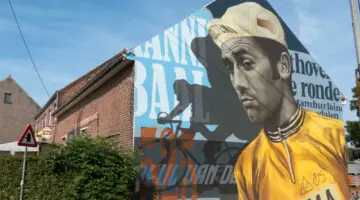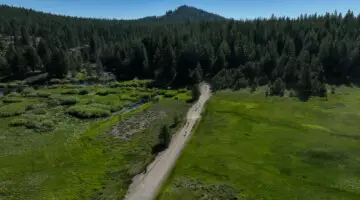2008 Cyclocross National Champion Tim Johnson is undefeated in Kansas City. As we return next week to Kansas City for the city’s third hosting of the national championships in eight years, very few people will bet against the Cannondale / CyclocrossWorld rider. We continue our Countdown to Nats series with an interview with the current national champion by Kerry Litka.
The full interview will be published in our Issue 5. Have you subscribed or renewed yet?
CXM: Where and when was your first ‘cross race and what were your first impressions?
TJ: Pittsfield, MA fall of 1995 – the BCA Cyclocross. It was a blast and the race came up in conversation with Stu (Thorne, of Cyclocrossworld.com) just the other day. We all piled into this matte-black station wagon that he had with Bay Road Bikes and headed out. I hadn’t raced road before and was coming straight from mountain bikes. I thought roadies were a bunch of lame squids…I had no idea what the smelly, shiny stuff on their legs was.
CXM: What kind of bike did you race at that first race?
TJ: I started out with my Cannondale F1000 with Ritchey 1.5 Zmax’s. It’s pretty fitting that they’re now my biggest supporter and have my signature model ‘cross bike in the lineup.
CXM: What was your first real ‘cross bike?
TJ: A few races into the season I started to come into my own and had a few wins under my belt. Stu hooked me up with one of Toby Stanton’s friends, Arnie Mostowy, who built me a steel ‘cross bike. I think I was one of his first and maybe last customers.
CXM: Is it hard to make a living as a bike racer at our age? I mean, when we’re 25 we’re completely ok with no retirement plan or health insurance or stability, but then we hit 30-ish and suddenly priorities tend to shift-is that something you are facing now?
TJ: Those kinds of concerns are very real and unfortunately make too much of an impact on people goals in the sport. I’ve been really fortunate to ride for teams that pay well enough to live on and have also had smart people around me to help make the right decisions. A professional cyclist is typically an independent contractor so decisions about insurance and retirement plans are our own to make. I’ve asked a lot questions and have also answered a lot of questions to my fellow riders. I’m currently working on starting a kind of trade group to address these issues so that a young athlete doesn’t have to be so overwhelmed at crucial points in a career. It’s tough enough to train at race at your best, real life has a way of being the straw that breaks the camel’s back.
CXM: How many hours a week do you train for ‘cross?
TJ: Not much [laughing]. I definitely try and milk the most out of my road season in the fall. I generally take 1 or 2 days off the bike entirely and on the ‘training days’ I’ll try and keep my lactate or pain thresholds high enough so that when I am racing, I’m able to function at a high level. The longest ride I’ll do consistently is probably 3hrs or so. I spend a lot of time on the rollers to keep the legs going. Racing 2 times per weekend gives me the majority of my intensity, so just keeping my efficiency high is usually the most I can ask for from my body. I definitely beat it up more than I should.
CXM: How much running do you do as part of your ‘cross training? Do you think people really need to incorporate much running into their training?
TJ: I usually don’t run very much. I used to toss in a couple jogging days when I was starting out and that seemed to round out my ‘cross skills. Now, with all of the dry, fast courses that we have in the States, I don’t miss it much. As we get into November and December, I’ll add some light running with my bike during my ‘cross workouts.
CXM: What is your opinion on the evolution of course design since you began racing ‘cross-are you happy with the ‘less barriers’ approach, or would you like to see a return to the older courses with mutiple run ups, sets of triple barriers, etc?
TJ: I miss the old days of 4 or 5 sets of barriers spaced out all over the course. I have always liked the technique aspect of ‘cross and was lucky enough to have learned from Tom Stevens and his crew back in the old days. We used to meet up at Concord-Carlisle High School and do laps of his course there. Being comfortable at hitting a set of flat barriers at 25mph used to be a huge advantage.
CXM: Have you ever considered doing what Jonathan Page did and base your entire season/career in Europe?
TJ: I actually did that back in 1999/2000. I lived with Bart Wellens and raced a full European season as a first year Senior. It was an eye opening experience to say the least. I had some successes with a good ride at the Koppenburg ‘cross but struggled overall. I wound up breaking my collarbone shortly after returning there after Nationals in the Presidio. It was a blessing in disguise as I was cracking pretty badly by then. I have the utmost respect for what Jonathan has been able to accomplish over these past few years. He’s an incredible rider and obviously has the drive and motivation to be a success at the highest level. It’s really just a case of different strokes between us. I’ve had a very successful road racing career and have accomplished a few things in ‘cross as well. I’ve made my choices and he his, so no, I’m not looking to live and race in Europe full-time anymore.
The entire interview will be in our Issue 5. Make sure you’ll get yours by renewing, subscribing or updating your address.
Weather in KC:
























